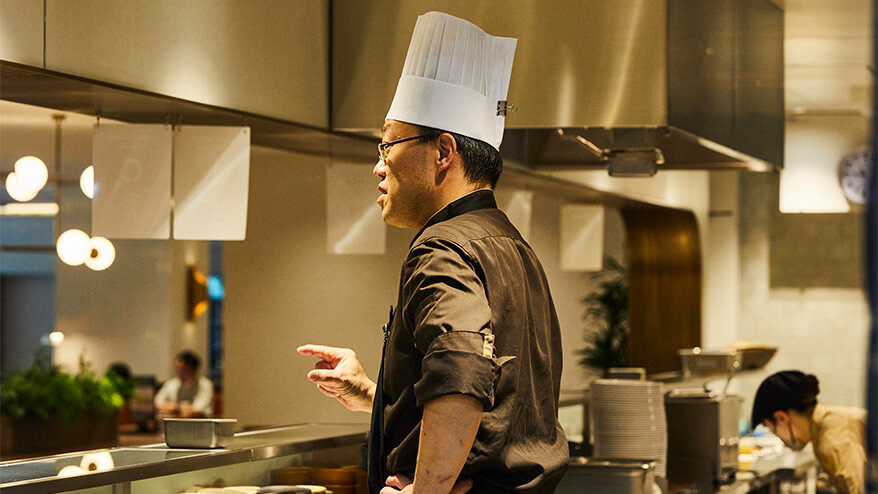こんにちは。京都で暮らすライター、杉本です。
引き続き、MONOSUS社食研の総料理長・飯野直樹さんのインタビューをお届けします。
前編では、包丁を握ったこともない18歳の飯野さんがどんなふうに料理の道に飛び込み、24歳にして料理長になったのかを聞かせていただきました。後編では、料理人としての飯野さんの覚悟と責任の持ち方、料理長としてのあり方、そしてモノサスで活躍する今とこれからをお話しいただいています
メインビジュアル写真の飯野さんの背中、かっこいいですよねえ。
この背中をしっかり目に焼き付けてから読み進めていただければ幸いです。
料理人としての覚悟と責任のもち方
杉本 ロイヤルマリオットでは、料理長として腕をふるっていたのにどうして辞めようと思ったんですか。
飯野 オープンも4店舗くらい経験して、最後は店長・料理長をやったんです。店長の肩書きがあれば、上に対して言いたいことが言えますから。ちょうど「現時点では赤字の店なんだけど、誰かやらないか?」って、店長・料理長会議で言われたので「俺、行きますよ。俺しかいないでしょ?」って手を挙げました。
杉本 なんか、かっこいいですね。
飯野 そこは九段食堂みたいに誰でも入れるお店で、夜は飲み屋もやってました。ちょうど結婚したばかりで、妻からは「結婚して痩せたって言われるからやめて」って言われるくらい大変でしたね。でも、1年目の赤字を2年目で半分返せる黒字を達成しました。たまたま、マリオットが撤収してロイヤル色が濃くなる時期で、新しい社長に「もう勝手にやるのは許さない」と言われたので辞めました。
杉本 勝手にやる、というのは?
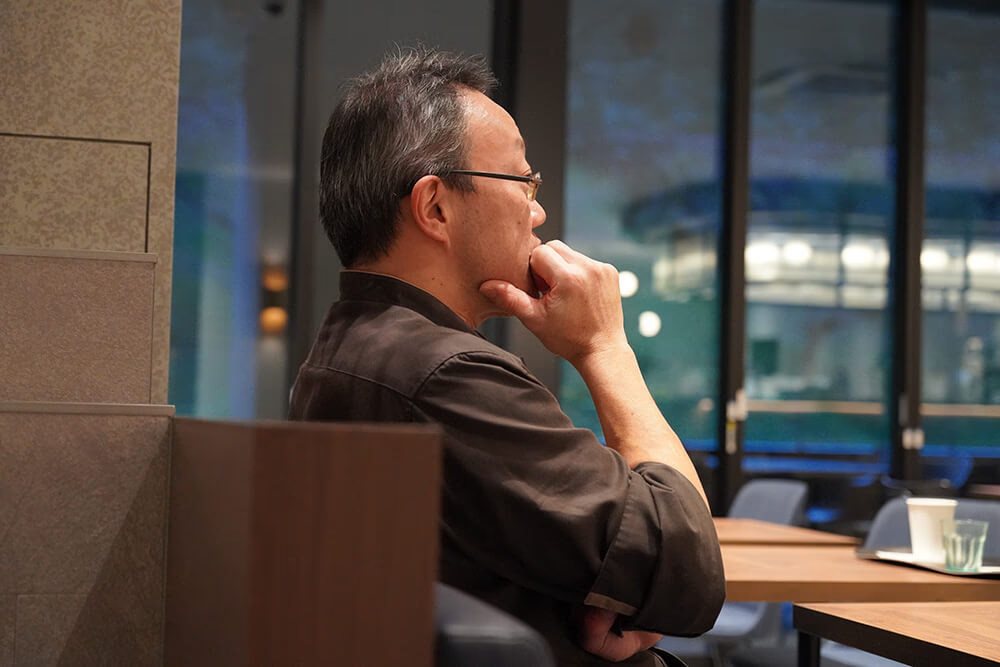
飯野 最初に料理長になったとき、会社に「レシピ通りにつくれ」ってすごい怒られたんですよ。でも、レシピ通りにつくってまずかったら、お客さんは僕に文句を言いにくるじゃないですか。「いや、総料理長が決めたメニューなので、文句があれば総料理長に言ってください」って言うのは違いますよね。だったら、僕がおいしいと思ったものをつくるのが普通だと思います。「レシピ通りでおいしいと思えばそのままつくるし、おいしくないと思えば自分のやり方にしますよ」って、ずっと揉めてきたんです。会社のレシピを守って怒られて謝るくらいなら、自分の味で謝ったほうがいいですから。でも、会社としてはそれが許せないわけですよね。
杉本 流れに棹さして生きてきたんですね。
飯野 勝手なことをする代償として、失敗したら辞めるっていつも決めているので。九段食堂でも、荒井さんの言うことすら聞かずに勝手なことをするわけです。もし、これで評判が良くならなければ、自分は通用しないんだなあと思うし、いつでも辞める覚悟はできています。
店長研修で出会った「インパクトのある男」
杉本 ロイヤルマリオットを辞めた後は?
飯野 24歳で料理長になっちゃったので、もう一度下の気持ちに気づきたいなと思って「下からやらせてください」って割烹のお店に入ったんですよ。トップにはいつでもなれるから。
杉本 「トップにはいつでもなれる」。また、かっこいいセリフが出た!
飯野 そこを辞めた後に、かつての同僚から大手コントラクトサービスを紹介されました。「この実績ならぜひ来てほしい」と言われて入社して、その半年後くらいかな。店長研修に参加したら、荒井さんがいたんですよ。あの顔だから、インパクトがあるじゃないですか。その後、荒井さんがGoogle Japan Food Teamの社員食堂をはじめるときに、僕を料理長にするよう裏で手を回していたんですよ。職場が六本木だと通勤に時間がかかるからイヤだなぁと思って行ったら、「荒井さんかー」って。それが出会いです。
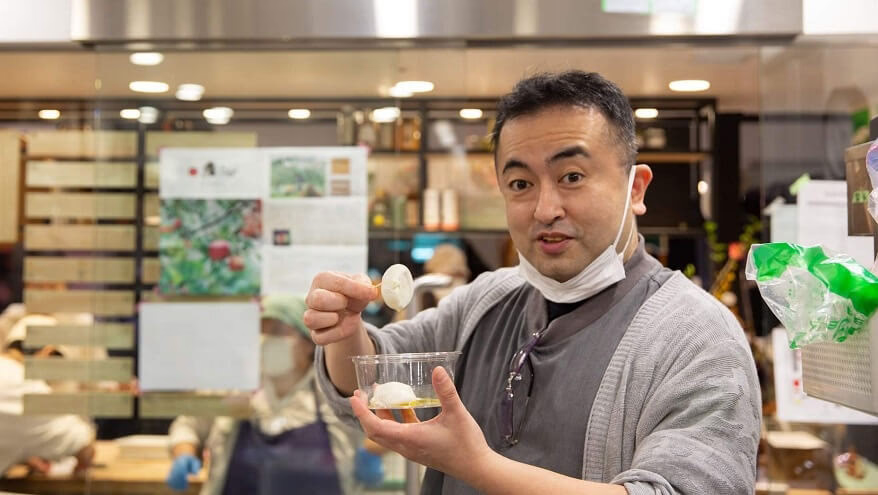 MONOSUS社食研 事業開発ディレクター荒井茂太
MONOSUS社食研 事業開発ディレクター荒井茂太
杉本 荒井さんはどうして飯野さんに目をつけていたんでしょう。
飯野 3年目くらいに、一日3000食を出す社食の料理長になって。社内で一番大きい社食を動かしている料理長って目立つじゃないですか。たぶん、それでじゃないかなぁ。ちゃんと話をしたのかもしれないけど、いきさつは覚えていないです(笑)。
Googleには、和食、洋食、中華にそれぞれ料理長クラスの人がいて、しかも僕よりみんな年上でした。誰も仕切る人がいなかったので、「あなたたちは好きなことをやっていていいので、僕が全部まとめます」と、発注から仕込みの流れから全部やりました。朝食から夕食まであって、通勤は片道1時間半......荒井さんにはよく言うんですけど、この世界にいて一番きつかったかな。
杉本 荒井さんと一緒に仕事をするのは楽しいですか?
飯野 最初の原点と一緒ですね。荒井さんは厳しいし、任せたうえでプレッシャーを与えてくるから、僕の性格上すごい楽です。結果を出さないといろいろ言ってくるってわかっているから、言われないようになるっていうのがスタイルに合っています。基本的に、結果は出すからほっといてほしいんですよね。
杉本 nonpiでもご一緒されていますよね。
飯野 当時のnonpiはケータリングだったから興味なかったんですけど、荒井さんが移って1年後くらいに「nonpiで社食を取ったから」と言われて移りました。モノサスも、九段食堂をやることになっていなければ来ていないし。基本的に、荒井さんがもってくる案件が僕に合っているから一緒に仕事をしているんだと思います。
杉本 モノサスは、飯野さんにとって初めて料理人以外の人がいる会社ですよね。
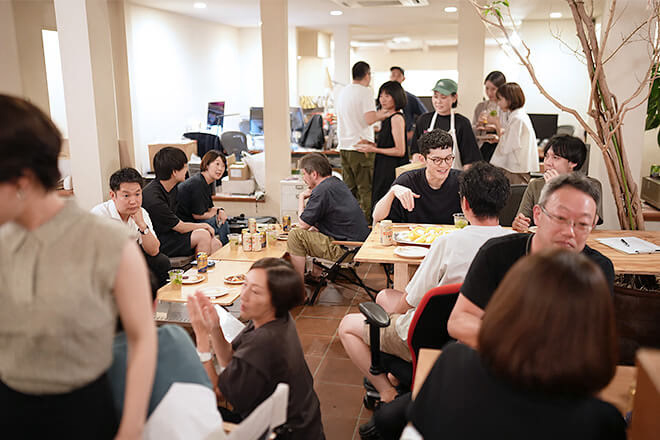 ある日の「居酒屋ものさす」にて。メンバーとの会話を楽しむ飯野さん
ある日の「居酒屋ものさす」にて。メンバーとの会話を楽しむ飯野さん
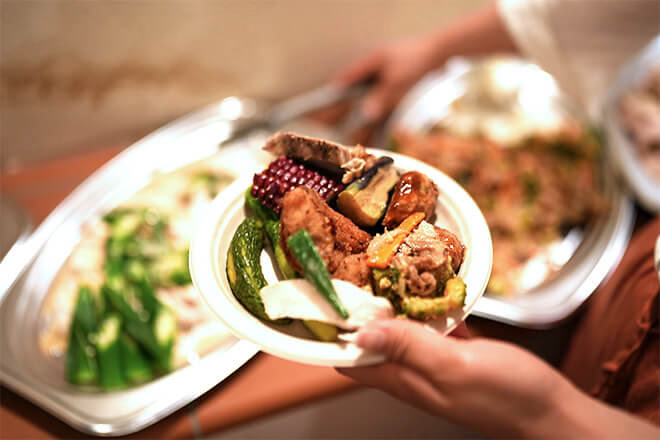 居酒屋ものさすは、モノサスの「夜の社食」として月1回開催。「メンバー間のコミュニケーションの機会を増やしたい」と思ったメンバーが企画し、2023年夏にスタートした。料理人は飯野さんと決まっているわけではないけれど、九段食堂の仕事終わりに飯野さんがやってきてキッチンで料理する姿が定番になっている
居酒屋ものさすは、モノサスの「夜の社食」として月1回開催。「メンバー間のコミュニケーションの機会を増やしたい」と思ったメンバーが企画し、2023年夏にスタートした。料理人は飯野さんと決まっているわけではないけれど、九段食堂の仕事終わりに飯野さんがやってきてキッチンで料理する姿が定番になっている
飯野 ずっと料理人しかいない職場だったからすごい新鮮です。「居酒屋ものさす」をやると、全然違う分野の人たちと話せるからすごい楽しいんですよ。モノサスには恩返ししたい気持ちがあって。僕がモノサスに入ったとき、まだ現場が始まっていなかったのにお給料をいただいていたから。九段食堂を立ち上げるときは、モノサスのメンバーが自慢できるところにしたいと心に決めてやっていました。運動会や居酒屋ものさすで料理をしたら、それもちょっと恩返しになるし、自分も楽しめるじゃないですか。
料理長として意識するのは「一番働くこと」
杉本 日々の仕事のなかで、オンオフはどうされているんですか?
飯野 基本的に月曜日は休み明けで仕事をしたくないので早く帰ります。火曜日、水曜日・木曜日のどちらか、週2日は残って金曜日は早く帰るというリズムです。料理長になってからずっと変わっていませんね。遅くまで営業している店はずっといることになるけど、お昼だけ出す店にいるときはだいたい週2回は夜7、8時までやって、あとは5時に上がると決めています。週2日残るのは、下の子たちを早く帰らせるためでもあります。
杉本 料理長として上に立つときに、大事にしていることはなんですか?
飯野 一番働く。「あの人が一番仕事しているよね」というのを見せたら許してくれるかなって(笑)。モットーとして、一番大事なのはお客さまで、次が従業員、その次が自分だと決めています。お客さんが満足して、でも従業員も満足していないとだめなので、彼らが満足する環境をつくってあげる。大変な仕事だから、みんなキツい部分はあると思うけど、「一番キツい仕事をするのは俺だよ」ていうのを常に見せておいたほうがいい。そこしか意識していないですね。
杉本 技術的なことなど、一緒に働く人たちに教えることはありますか?
飯野 みんな新人じゃないから、あとは本人たちがどこを覚えたいかだけなので。「これ、どうやってつくっているんですか?」と聞かれたら教えますけど、味については感覚でしかないんです。教えられない部分だなといつも思います。
杉本 料理人のなかには「仕事以外では料理したくない」という方もおられますが、飯野さんはご自宅では料理されますか?
飯野 平日はもう寝るだけだから、夜は家で食べないんです。土日は自分でつくります。結婚したとき、「平日の夜ごはんはいらない」と言ったので、妻は土日くらいはつくろうと張り切ってくれていたんですよ。でも、僕としては自分がつくるほうがぱぱっと終わって食べたいものをつくれるから。最初は妻も抵抗していましたけど、子どもができるとその方が楽だって気づいたみたいです。
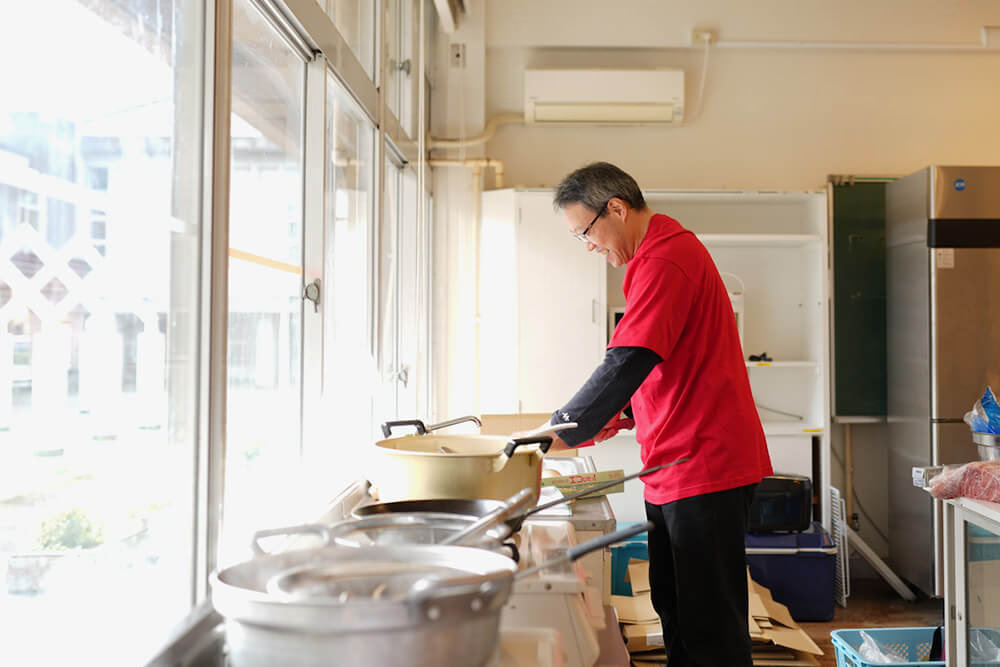
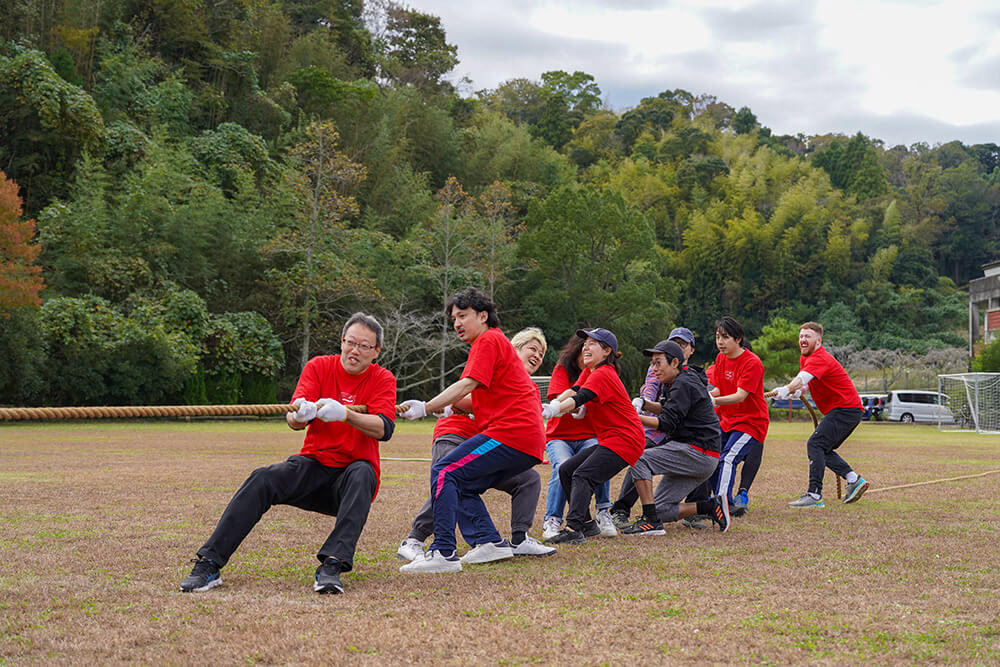 秋に開催するモノサス運動会では、みんなのごはんをつくりつつ競技にも参加!
秋に開催するモノサス運動会では、みんなのごはんをつくりつつ競技にも参加!
料理は日常、社食は平穏無事がいちばん
杉本 メニューってどんなふうに決めているんですか?
飯野 今まで約10店舗の料理長をやってきたんですけど、僕はレシピを全部置いてきちゃうんです。新しい店をオープンするときは何が出るかわからないから、暫定的にメニューを組んでお客さんの反応を見ながら変えたりします。そのへんはもう、本当に感覚でやっていますね。自分の思いを入れすぎて「こういうものを食べさせたいな」とか思うと出ないので、それは封印しています。
杉本 家族のための料理から3000人に向けての料理まで、いろんな料理をつくってきた飯野さんにとって、料理をつくるってどういう行為なんですか。
飯野 日常じゃないですかね。
杉本 仕事をしていて「よし」って思うのはどういうときですか?
飯野 うーん、平穏無事かなあ(笑)。お客さんがたくさん来てくれて、そのときにやるだけのことをすべてやって満足感を得るときもあるんですけど、スムーズに提供できなかったら「いい仕事をしていないなあ」と反省するときもあるし。こちらは全品切らさずに出来立てをうまく提供できて、お客さんも並んだりせずに食べられて、みんながおいしいと言ってくれることが、僕にとっての平穏無事です。
杉本 それは、社員食堂という日常の食を提供する場で一番大事なことなのかもしれませんね。いつかこの仕事を引退したら、やりたいことはありますか? たとえば、自分のお店を持ちたいとか。
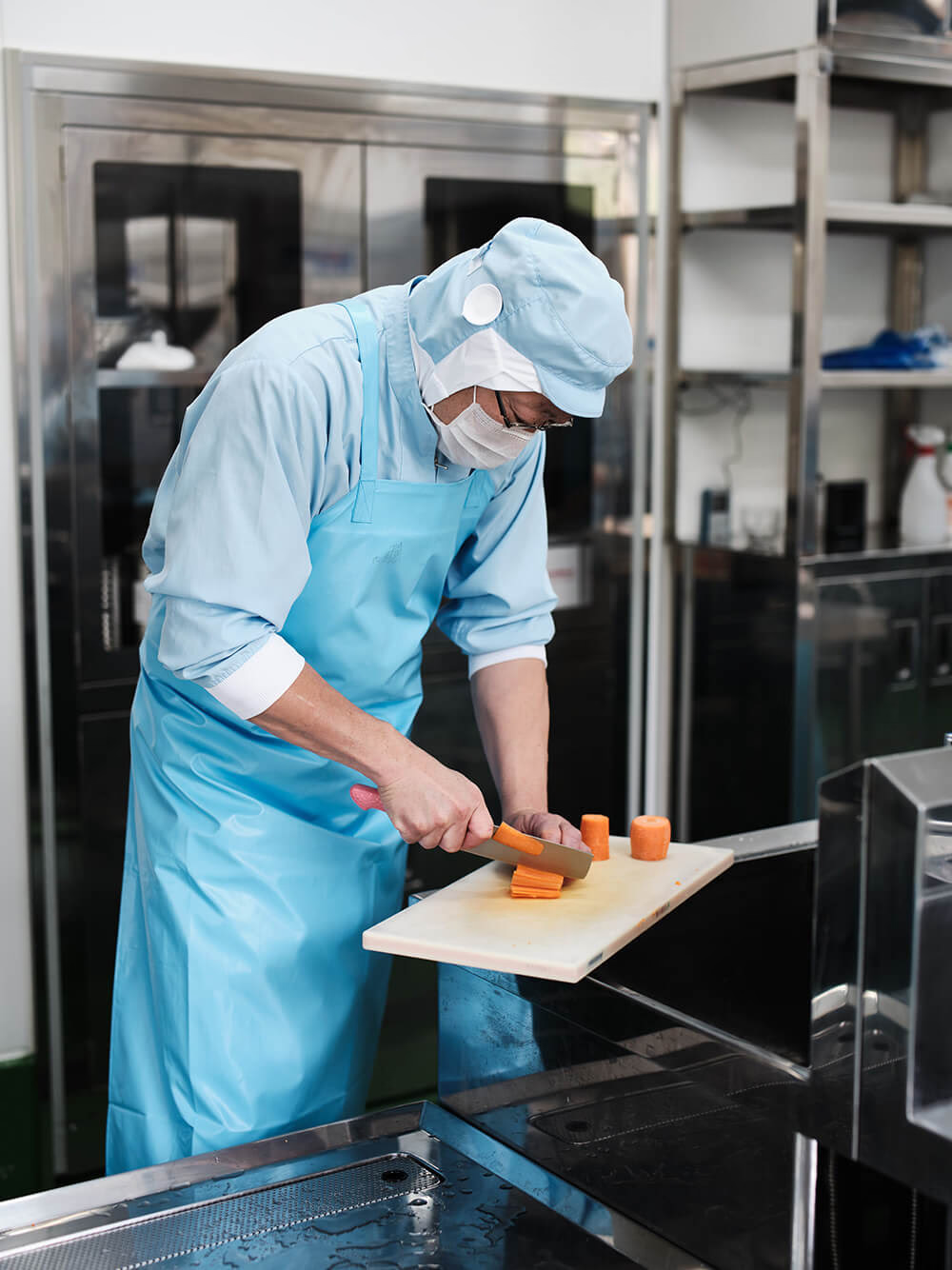 神山町給食センターにて。野菜をすべて手切りに変えたことで味が格段によくなったそう
神山町給食センターにて。野菜をすべて手切りに変えたことで味が格段によくなったそう
飯野 いや、僕は給食センターをやりたい。要は、神山でやった給食センターだけが、自分の仕事のなかで心残りがあるんです。働いている人たちは料理人ではないので感覚で伝わらないから、分量も調理時間も明確化して伝えて引き継がなければいけなかった。人生で初めてくらいレシピを読み込んで、自分のカラーを出さずに「この調味料で、この分量でどうおいしくつくるか」を教えてきました。初めてですかね、自分を殺したのは。
もっと変えたいことがいっぱいあったのに、自分がちゃんと入りきれなくてやり切ってないんですよ。神山なら200食くらいだからやりやすいし、本気で5年くらいやれば改革できると思っています。もともと、60歳くらいからは、まちの子ども食堂をやりたいと思っていました。でも、給食センターに出会っちゃったから。今はそっちがゴールかなと思っています。
杉本 「自分が変えられる」と思うと見過ごせないんですね。
飯野 そうですね。ずっと会社のやり方に逆らって変えてきたので。60歳までは現場にいて、そしたら息子は20歳になるからちょうどいいかなぁと思っています。わかんないですけどね。過去も見ないけど先も見ないですから。
杉本 今を生きる飯野さん、最後まで名言いただきました!この記事でまた飯野さんのファンが増えそうです。ありがとうございました。
いつもニコニコしていて、のんびりとお話しされる飯野さんの骨の部分をたっぷり聞かせていただいた気持ちです。インタビューのようすを遠くから見ていたらしい眞鍋さんが、「飯野さん、歌ってたね!」って声をかけてくれたのですがほんとにいい歌でした。
「食べる」ってすごく日常であり、また特別な日をつくる行為でもあります。飯野さんがつくってくれる平穏無事に食べる時間は、日常に溶け込んでそっと誰かを支えてくれるような特別さなんだろうなと思います。飯野さんが総料理長を務める(その飯野さんにプレッシャーを与える存在、荒井さん率いる)MONOSUS社食研の今後にどうぞご期待ください!
